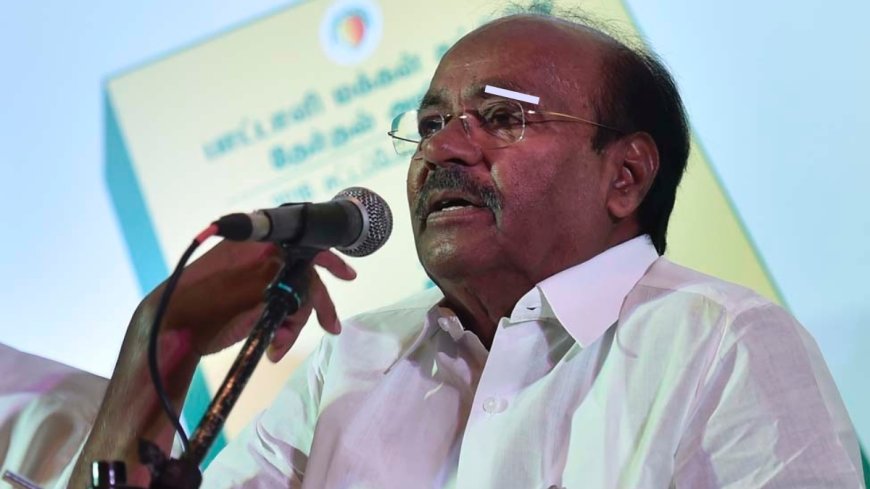Ramadoss to Remain PMK Chief Until 2026 Elections: What This Means for Tamil Nadu Politics
Dr. S. Ramadoss will remain PMK President until the 2026 elections. The move reshapes Tamil Nadu’s political alliances and signals a return to hardline caste-based strategies.

By Ronald Kapper | June 13, 2025
In a significant political development, Dr. S. Ramadoss, founder and patriarch of the Pattali Makkal Katchi (PMK), has announced that he will continue as party president until the 2026 Tamil Nadu Assembly elections. The declaration was made at the party's executive committee meeting held in Chennai, ending weeks of speculation about a leadership transition to his son, Dr. Anbumani Ramadoss.
This announcement has stirred fresh debate within regional political circles, particularly at a time when coalition talks and alliances are beginning to take shape for the next state elections.
Why Ramadoss Is Holding On
Dr. Ramadoss, who established PMK in 1989 to represent the interests of the Vanniyar community, stated that his decision to remain in charge was aimed at preserving ideological clarity and organizational discipline in the run-up to a “critical” electoral battle.
“The leadership transition will happen in due course, but now is the time for collective effort and continuity,” he reportedly told party functionaries, according to a Times of India report.
The party, which has oscillated between alliances with both the DMK and AIADMK over the years, is reportedly in early talks with the Bharatiya Janata Party (BJP) for a broader coalition strategy in 2026.
Implications for Tamil Nadu’s Political Landscape
Dr. Ramadoss’s decision is not just a party affair—it has ripple effects across Tamil Nadu’s political spectrum. Analysts believe this could signal a more conservative approach by PMK in seat-sharing talks and policy positioning, particularly on contentious issues like reservations and caste-based census.
According to political analyst Ramu Manivannan, "The PMK is banking on its traditional Vanniyar vote base, and Dr. Ramadoss staying at the helm reinforces a hardline stance that appeals to core constituents."
The move also temporarily sidelines Dr. Anbumani Ramadoss, a former Union Health Minister, who has long been projected as the party’s modern and technocratic face. His leadership has been central to PMK’s image revamp, particularly on issues like environmental sustainability and public health, as reflected in his work on air pollution awareness and state-run health initiatives—well documented by platforms such as PRS Legislative Research.
Alliance Math: Where Does PMK Stand Now?
In recent elections, PMK has struggled to expand beyond its caste stronghold. The party secured 5.4% of the vote share in the 2021 state elections, contesting in alliance with the AIADMK-BJP bloc. However, internal surveys, as cited in a report by The Hindu, suggest PMK’s vote bank could be leveraged better if it aligns early and secures more than just symbolic seats.
Senior BJP leaders are reportedly in touch with Ramadoss to revive the National Democratic Alliance (NDA) framework in Tamil Nadu. An alliance announcement is expected before the end of this year.
A Delicate Balancing Act Within the Party
Sources inside PMK indicate that there was internal pressure for a generational shift. Several district-level leaders are said to favor Anbumani’s elevation, citing his ability to attract urban voters and his international exposure. However, Dr. Ramadoss’s continued presidency puts a temporary hold on that transition.
Party insiders also note that the decision may be linked to electoral negotiations, where Dr. Ramadoss’s negotiating clout among larger alliance partners remains unmatched.
A detailed commentary on the party's inner workings can be found in this Carnegie India analysis on caste and coalition dynamics, which continues to remain relevant in the current context.
What’s Next for PMK?
With Dr. Ramadoss at the helm, PMK is expected to double down on its Vanniyar reservation plank, oppose the proposed Uniform Civil Code, and advocate for increased funding to rural health and education schemes—areas where it sees electoral gains.
The party will also launch a statewide outreach campaign targeting youth voters in districts like Villupuram, Dharmapuri, and Cuddalore, traditionally PMK strongholds.
Conclusion
The decision to delay a leadership handover may frustrate reformists within PMK, but it underscores a strategic choice for electoral continuity over experimentation. With the 2026 elections just over a year away, Dr. S. Ramadoss seems determined to steer the ship through yet another high-stakes campaign.
For Tamil Nadu, where political memory runs deep and alliances often make or break electoral fortunes, this development signals that the old guard is not ready to bow out just yet.














